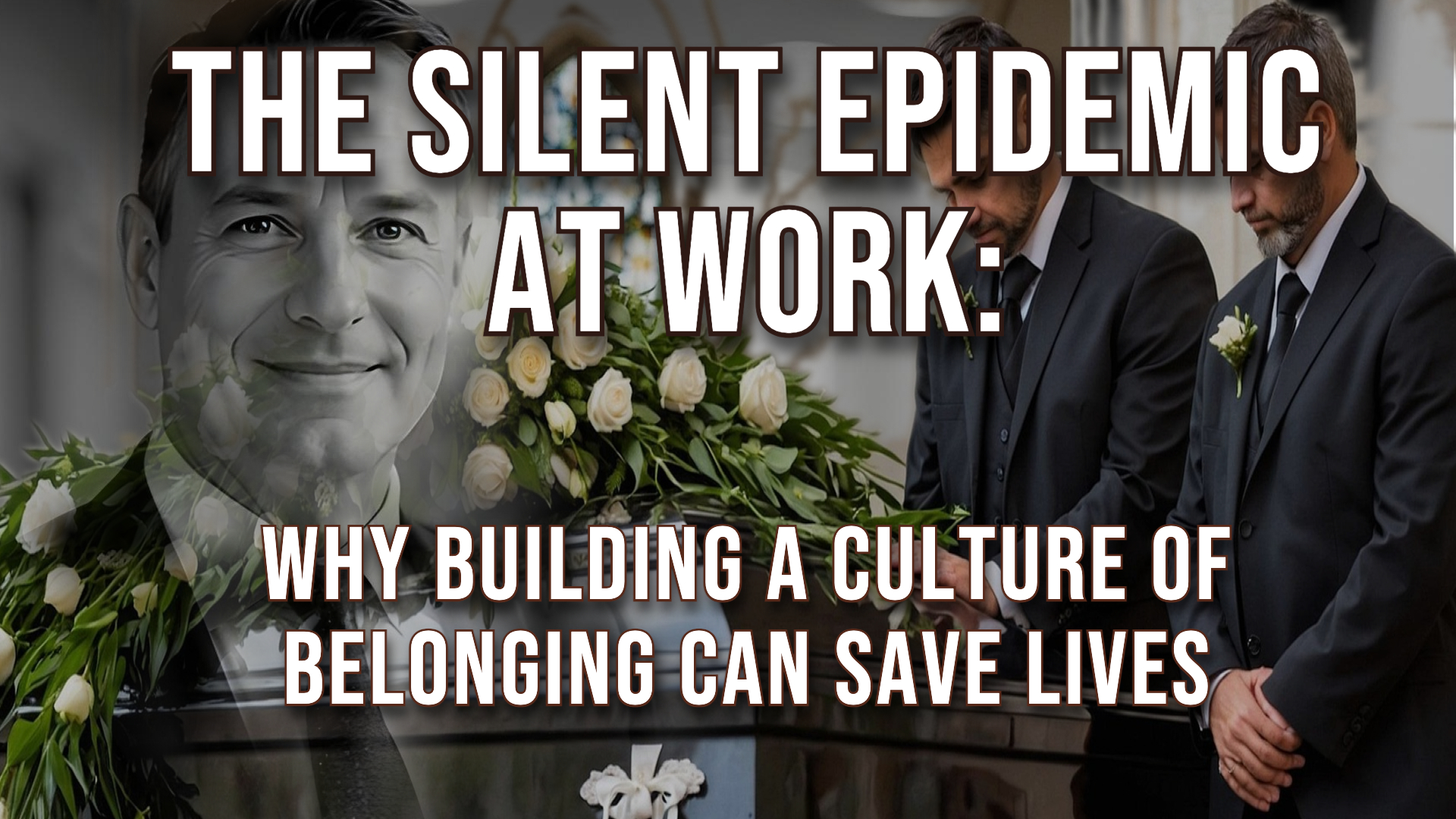Peter came on Zoom, and it was immediately evident that something was off…
His eyes were full as he shared a moment he knew he’d never forget: A devastating call that one of their top-performing team members had taken his own life.
Peter sincerely admired this rising star—a man who always seemed in control. Yet behind the success and polished demeanor was a silent struggle no one, including Peter, had noticed.
For Peter, the shock wasn’t just about the loss—it was the painful realization that despite the got-it-all-together demeanor, the signs had been there, and my client had missed them. At that moment, the devastating truth that hit Peter was realizing that the workplace wasn’t the safety net it could have been.
Today and every day, someone in your organization battles loneliness so deep that it could kill them. They might be your top performer, your most loyal employee, or even the smiley one you think has it all together. This is a reality we cannot ignore, and it’s a call to action for all of us.
If you’re not creating a culture of belonging, you could lose them in ways you can’t afford—emotionally, professionally, or tragically, permanently.
How a Corporate Culture of Belonging Can Save Lives
We live in a more electronically connected world than ever, and we’re facing a paradox: we’re lonelier than ever.
It’s not just a social concern; it’s a silent epidemic that’s taking lives. For decades, bridge clubs, bowling leagues, and book clubs gave us a sense of belonging. They were our anchors, places where we felt seen and connected. But those social structures are fading, particularly in a post-pandemic world. And now, people are looking for something else to fill that void—their workplace.
At first glance, this might seem unfair or unreasonable. After all, isn’t work just about productivity and results? But here’s the harsh reality: If we as leaders don’t step up and create workplaces where people feel they truly belong, we risk losing talent and lives! The power to change this lies in our hands as leaders and it’s a responsibility we must not shy away from.
Let me be clear: this isn’t just about throwing a few pizza parties or plastering “We’re a family” on the company website. It’s about creating a deep, authentic culture of belonging—one where people feel safe, valued, and connected. And it’s not just a nice-to-have. It’s life or death!
The Loneliness Epidemic: A Crisis We Can’t Ignore
In the wake of the pandemic, the world shifted in ways we’re only beginning to recognize the impact of. Remote work became the norm, and while it offered flexibility, it also chipped away at the natural social bonds we once took for granted.
 Add to this the decline of community spaces like churches, clubs, and recreational groups, and you’ve got a perfect storm.
Add to this the decline of community spaces like churches, clubs, and recreational groups, and you’ve got a perfect storm.
People are emotionally and socially untethered. This untethering leaves them susceptible to the winds of change, and accelerating those winds are the giant machines of division.
According to recent studies, loneliness is as dangerous as smoking 15 cigarettes a day. It’s linked to higher rates of depression, anxiety, and even suicide. Research from the Harvard Graduate School of Education reveals that 36% of all Americans—including 61% of young adults and 51% of mothers with young children—report feeling “serious loneliness.”
Work no longer has the simple context of being the place we go to make a paycheck. People are looking for more than a paycheck; they want connection, purpose, and meaning. They’re searching for belonging, and many hope to find it at work.
Why This Matters to You as a Leader
If you’re reading this, you’re likely a senior leader who prides yourself on emotional intelligence and your ability to inspire. But let’s face it: traditional leadership models don’t prepare us for this social and emotional responsibility level. You might even feel it’s not your job to fix society’s problems.
Here’s the thing: It may not be your job, but it is your responsibility! You’ve likely experienced the challenges of loneliness and the power of belonging in your own life, and now it’s time to bring that understanding to your leadership role.
 The old ‘leave your personal life at home’ adage may have been one that some leaders wish was still true, but it isn’t. There was a clear separation between personal and professional life in the past, but today’s employees are looking for more than just a paycheck from their jobs. They want to feel connected, valued, and part of a community at work.
The old ‘leave your personal life at home’ adage may have been one that some leaders wish was still true, but it isn’t. There was a clear separation between personal and professional life in the past, but today’s employees are looking for more than just a paycheck from their jobs. They want to feel connected, valued, and part of a community at work.
When people come to work, they bring their whole selves—their triumphs, struggles, and loneliness. We fail them and our organizations if we don’t create spaces where they can feel connected.
Disconnected employees are less productive, less innovative, and more likely to leave. Worse yet, some won’t leave—they’ll simply withdraw emotionally, becoming a shadow of their potential selves. In the most tragic cases, some may feel isolated and see no way out.
Here’s the uncomfortable truths we must ask:
What’s the cost of leadership silence?
How many lives must be lost before we admit that leadership today demands more than spreadsheets and strategies?
The Ripple Effect of Emotions in the Workplace
In today’s interconnected work environments, the recognition of emotional contagion has gained significant attention. Emotional contagion is the phenomenon where one person’s emotions and related behaviors directly trigger similar emotions and behaviors in others. For example, a leader’s frustration can quickly spread to the entire team, affecting their productivity and morale.
Research by Sigal Barsade at Yale School of Management has demonstrated that emotions can spread throughout an organization, profoundly impacting workplace dynamics and productivity.
This phenomenon underscores the critical importance of creating cultures of belonging in the workplace.
Barsade’s research revealed that moods and emotions can transfer between individuals within a group setting, with unpleasant emotions being more contagious than pleasant ones. Moreover, emotions expressed with higher energy levels led to stronger contagion effects.
This “ripple effect” can significantly influence team dynamics, cooperation, and overall organizational climate.
 Recent studies have expanded on Barsade’s work, showing that emotional contagion can have far-reaching consequences. A 2021 study found that the contagion of anger among employees can lead to more significant accidents and injuries due to insufficient sleep and health problems. Conversely, the contagion of joy was associated with fewer sleep disturbances.
Recent studies have expanded on Barsade’s work, showing that emotional contagion can have far-reaching consequences. A 2021 study found that the contagion of anger among employees can lead to more significant accidents and injuries due to insufficient sleep and health problems. Conversely, the contagion of joy was associated with fewer sleep disturbances.
Building a Culture of Belonging
Creating a culture of belonging isn’t about being a therapist. It’s about being a leader who understands that emotional well-being is not just a personal matter but also foundational to human performance. This understanding can drive us to make significant changes in our organizations.
Here are three steps to get started:
 Prioritize Psychological Safety
Prioritize Psychological Safety
Create an environment where people feel safe speaking up, making mistakes, and being vulnerable.
Psychological safety isn’t a buzzword; it’s a prerequisite for trust and connection.
A Google study found that teams with high psychological safety outperformed others on almost every metric, from innovation to revenue.
 Foster Genuine Relationships
Foster Genuine Relationships
Encourage mentorship, collaboration, and team-building initiatives that go beyond surface-level interactions.
People must feel that they have real allies, not just colleagues or virtue signalers. One-on-one check-ins and peer-led support groups can help bridge the gap between isolation and connection.
 Model Authenticity
Model Authenticity
Vulnerability starts at the top. But let me be clear: vulnerability is NOT about moaning, whining, and complaining while blowing snot bubbles.
Vulnerability is simply about removing the armor and letting people see and be with your humanity.
Share your challenges and create a culture where it’s okay not to be okay. When leaders model authenticity, it gives others permission to do the same. Again, this isn’t about oversharing—it’s about demonstrating that strength and vulnerability can coexist.
Positive Emotional Climate and Workplace Safety
Given the powerful influence of emotional contagion, creating a culture of belonging becomes paramount for organizations seeking to foster positive workplace dynamics and enhance productivity.
A culture of belonging promotes positive emotions, which can spread throughout the organization, leading to improved cooperation and decreased conflict. When employees feel they belong, they are less likely to experience negative emotions that can lead to sleep disturbances and health problems.
By fostering positive emotions, organizations can reduce workplace accidents and injuries associated with negative emotional contagion. Employees who feel a sense of belonging are likelier to be engaged and motivated in their work, contributing to overall organizational success.
The Cost of Inaction
You might be thinking, “This sounds like a lot of effort. Is it really worth it?” Let me ask you this: What’s the cost of doing nothing? What’s the cost of losing your top performers because they feel invisible?
What’s the cost of losing someone entirely because they couldn’t find the emotional community connection they desperately needed?
A recent WEF report highlighted that loneliness and social disconnection cost U.S. businesses over $154 billion annually in lost productivity. Beyond the financial toll, the human cost is immeasurable.
This isn’t just about retention or productivity. It’s about humanity. If we don’t take action, the loneliness epidemic will continue to grow, and the consequences will be devastating—for our people, our organizations, and society as a whole.
A Challenge to Leaders
If you see yourself as more than a manager of tasks but as a leader of hearts, then the call is clear: Step up!
Decide now—will you be the leader who dared to create a workplace where belonging is not a buzzword but the oxygen your people need to thrive? Or will you stand by and let this epidemic of loneliness take its toll on the very lives you’re tasked with leading?
Be the kind of leader who not only saves the bottom line but also saves lives. Because in a world where loneliness can kill, belonging isn’t just important—it’s essential.




